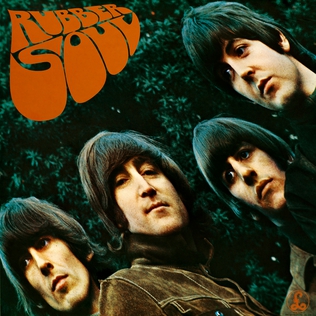
Rubber Soul is the sixth studio album by the English rock band the Beatles. It was released on 3 December 1965 in the United Kingdom, on EMI's Parlophone label, accompanied by the non-album double A-side single "Day Tripper" / "We Can Work It Out". The original North American release, issued by Capitol Records, contains ten of the fourteen songs and two tracks withheld from the band's Help! album. Rubber Soul was met with a highly favourable critical response and topped sales charts in Britain and the United States for several weeks.
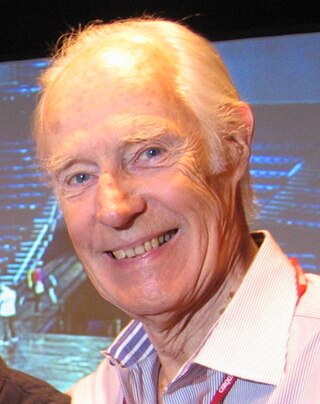
Sir George Henry Martin was an English record producer, arranger, composer, conductor, and musician. He was commonly referred to as the "Fifth Beatle" because of his extensive involvement in each of the Beatles' original albums. AllMusic has described him as the "world's most famous record producer". Martin's formal musical expertise and interest in novel recording practices complemented the Beatles' rudimentary musical education and relentless quest for new musical sounds to record. Most of the Beatles' orchestral arrangements and instrumentation were written or performed by Martin, and he played piano or keyboards on a number of their records. Martin's collaboration with the Beatles resulted in popular, highly acclaimed records with innovative sounds, such as the 1967 album Sgt. Pepper's Lonely Hearts Club Band—the first rock album to win a Grammy Award for Album of the Year.

"Lucy in the Sky with Diamonds" is a song by the English rock band the Beatles from their 1967 album Sgt. Pepper's Lonely Hearts Club Band. It was written primarily by John Lennon and credited to the Lennon–McCartney songwriting partnership. Lennon's son Julian inspired the song with a nursery school drawing that he called "Lucy – in the sky with diamonds". Shortly before the album's release, speculation arose that the first letter of each of the nouns in the title intentionally spelled "LSD", the initialism commonly used for the hallucinogenic drug lysergic acid diethylamide. Lennon repeatedly denied that he had intended it as a drug song, and attributed the song's fantastical imagery to his reading of Lewis Carroll's Alice in Wonderland books.

"A Day in the Life" is a song by the English rock band the Beatles that was released as the final track of their 1967 album Sgt. Pepper's Lonely Hearts Club Band. Credited to Lennon–McCartney, the opening and closing sections of the song were mainly written by John Lennon, with Paul McCartney primarily contributing the song's middle section. All four Beatles played a role in shaping the final arrangement of the song.

"Norwegian Wood (This Bird Has Flown)" is a song by the English rock band the Beatles from their 1965 album Rubber Soul. It was written mainly by John Lennon, with lyrical contributions from Paul McCartney, and credited to the Lennon–McCartney songwriting partnership. Influenced by the introspective lyrics of Bob Dylan, the song is considered a milestone in the Beatles' development as songwriters. The track features a sitar part, played by lead guitarist George Harrison, that marked the second appearance of the Indian string instrument on a Western rock recording, four months after the release of the Kinks See My Friends. The song was a number 1 hit in Australia when released on a single there in 1966, coupled with "Nowhere Man".

"Back in the U.S.S.R." is a song by the English rock band the Beatles and the first track of the 1968 double album The Beatles. Written by Paul McCartney and credited to the Lennon–McCartney partnership, the song is a parody of Chuck Berry's "Back in the U.S.A." and the Beach Boys' "California Girls". The lyrics subvert Berry's patriotic sentiments about the United States, as the narrator expresses relief upon returning home to the Soviet Union, formally the Union of Soviet Socialist Republics (USSR).
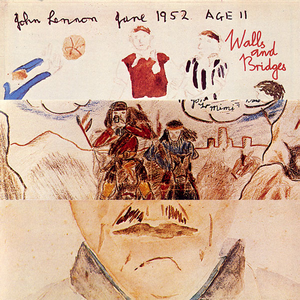
Walls and Bridges is the fifth studio album by English musician John Lennon. It was issued by Apple Records on 26 September 1974 in the United States and on 4 October in the United Kingdom. Written, recorded and released during his 18-month separation from Yoko Ono, the album captured Lennon in the midst of his "Lost Weekend". Walls and Bridges was an American number-one album on both the Billboard and Record World charts and included two hit singles, "Whatever Gets You thru the Night" and "#9 Dream". The first of these was Lennon's first number-one hit in the United States as a solo artist, and his only solo chart-topping single in either the US or Britain during his lifetime.
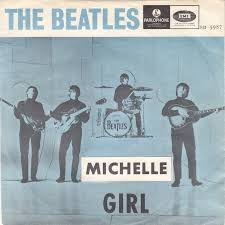
"Michelle" is a song by the English rock band the Beatles from their 1965 album Rubber Soul. It was composed principally by Paul McCartney, with the middle eight co-written with John Lennon. The song is a love ballad with part of its lyrics sung in French.
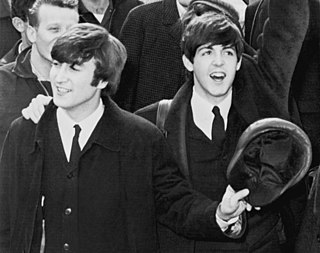
Lennon–McCartney was the songwriting partnership between English musicians John Lennon (1940–1980) and Paul McCartney of the Beatles. It is the best-known and most successful musical collaboration ever by records sold, with the Beatles selling over 600 million records worldwide as of 2004. Between 5 October 1962 and 8 May 1970, the partnership published approximately 180 jointly credited songs, of which the vast majority were recorded by the Beatles, forming the bulk of their catalogue.
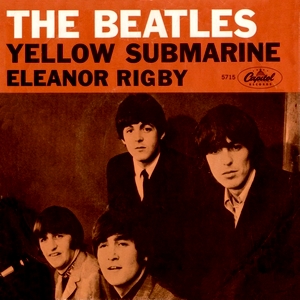
"Eleanor Rigby" is a song by the English rock band the Beatles from their 1966 album Revolver. It was also issued on a double A-side single, paired with "Yellow Submarine". The song was written primarily by Paul McCartney and credited to Lennon–McCartney.
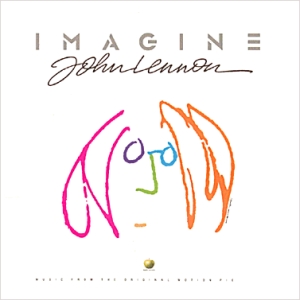
Imagine: John Lennon is a soundtrack album of popular music compiled for the 1988 documentary film Imagine: John Lennon from songs written or co-written by John Lennon. Originally released that year as a double album, it now remains available on one CD.

"You've Got to Hide Your Love Away" is a song by the English rock band the Beatles. It was written and sung by John Lennon and released on the album Help! in August 1965.
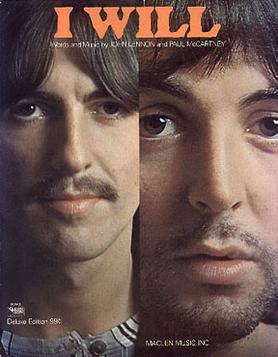
"I Will" is a song by the English rock band the Beatles, from their 1968 double album The Beatles. It was written by Paul McCartney and features him on lead vocal, guitar, and "vocal bass".
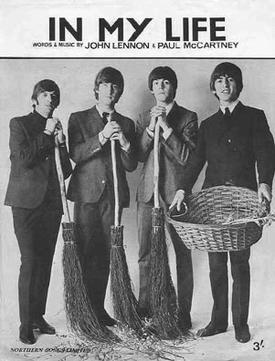
"In My Life" is a song by the English rock band the Beatles. It appeared on their 1965 album Rubber Soul. Its lyrics were written primarily by John Lennon, credited to Lennon–McCartney. George Martin contributed the piano solo bridge.
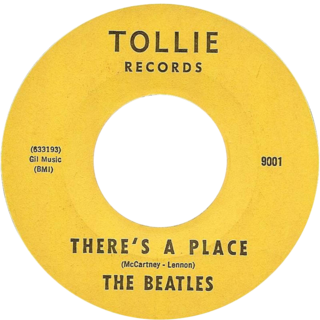
"There's a Place" is a song by the English rock band the Beatles from their debut album, Please Please Me, released in March 1963. It was written primarily by John Lennon and credited to McCartney–Lennon. In the United States, the song was released in July 1963 on the group's first US LP, Introducing... The Beatles, later reissued in January 1964 as Beatlemania surged there. It was also issued as a non-album single in the US, in March 1964, as the B-side to "Twist and Shout", reaching number 74 in the Billboard Hot 100.

"Good Night" is a song by the English rock band the Beatles from their 1968 double album The Beatles. It was written by John Lennon and credited to Lennon–McCartney. The lead vocalist on the recording is Ringo Starr, who was the only Beatle to appear on the track. The music was provided by an orchestra arranged and conducted by George Martin. Written for Lennon's five-year-old son Julian, "Good Night" is the final song on the White Album.
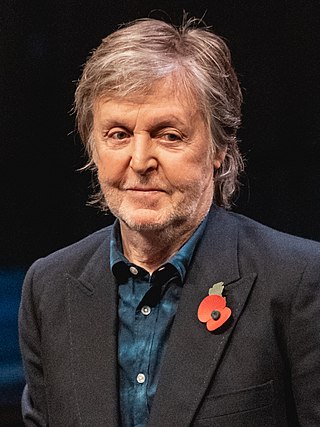
Sir James Paul McCartney is an English singer, songwriter and musician who gained worldwide fame with the Beatles, for whom he played bass guitar and shared primary songwriting and lead vocal duties with John Lennon. One of the most successful composers and performers of all time, McCartney is known for his melodic approach to bass-playing, versatile and wide tenor vocal range, and musical eclecticism, exploring genres ranging from pre–rock and roll pop to classical, ballads, and electronica. His songwriting partnership with Lennon remains the most successful in history.
The Beatles were originally a quartet, but only two of the members remain. John Lennon was murdered in December 1980, and George Harrison succumbed to lung cancer in 2001. There have been numerous tributes to both of them.

"Got to Get You into My Life" is a song by the English rock band the Beatles, first released in 1966 on their album Revolver. It was written by Paul McCartney and credited to Lennon–McCartney. The song is a homage to the Motown Sound, with colourful brass instrumentation and lyrics that suggest a psychedelic experience. "It's actually an ode to pot," McCartney explained. A cover version by Cliff Bennett and the Rebel Rousers, produced by McCartney, peaked at number six in 1966 in the UK. The song was issued in the United States as a single from the Rock 'n' Roll Music compilation album in 1976, six years after the Beatles disbanded. Another cover version by Earth, Wind & Fire from the Sgt. Pepper's Lonely Hearts Club Band film soundtrack peaked at number nine in the US in 1978.
"Warm and Beautiful" is a love ballad credited to Paul and Linda McCartney that was first released by Wings on their 1976 album Wings at the Speed of Sound. It is a love ballad sung by Paul directed to Linda. Critical opinion of the song has varied widely, ranging from a comment that it is "one of the most beautiful songs that Paul ever wrote for Linda," to a suggestion that it may be "one of the worst songs Paul McCartney has ever written." In 1998, after Linda's death, Paul rearranged the song for string quartet to be played at memorial concerts for his late wife. This version was included on the 1999 album Working Classical.
















